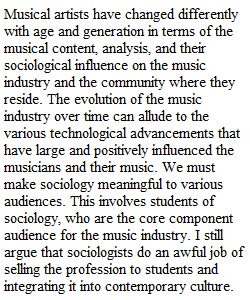


Q Your assignment is to write a short original paper (1000 words minimum) comparing a contemporary popular artist to any historical figure presented in the course. Your comparison may be based on musical analysis, biographical information, sociological influence, or a combination thereof. For example, you could argue that Jay-Z is currently viewed by the hip-hop community in a similar way that Haydn was viewed by other composers in the Classical era, or that both Beyoncé's and J.S. Bach's music are strongly influenced by religious institutions of their time. If you have another idea for a comparison for your paper that is outside of the above guidelines, please propose it to me, as I'm open to creative ideas. We've done a few examples of this type of comparison throughout the semester. However, you may not use an example that I've presented in class for your topic! A key requirement for the paper is that you read a book about your historical figure in order to gather research on your subject. Your book should be a full-length published source, and may be in text or electronic form. Please don't use an encyclopedia entry as your sole biographical source, as I'm looking for something more substantial. Alternatively, you may present your comparison orally to the class. Your presentation should be roughly 30 minutes long, with five minutes allowed for questions and a maximum of ten minutes allowed for musical examples. Anyone choosing to make the oral presentation to the class does not have to write a final paper. I'll allow a maximum of five student presentations during the semester. If more than five students choose this option, a drawing will be used in class to determine those presenting. The grading criteria for the presentation will be the same as that for the paper. As with the paper, you will need to read a full-length book on your historical figure to gather background information. If you wish to give a presentation, please let me know as soon as possible so that I'm able to schedule classes accordingly. An "A" paper/presentation will: - contain original thought. - mainly consist of your points of comparison, rather than biographical data. - use solid musical examples for both the classical and contemporary artists. - use citations properly (MLA style Links to an external site., with in-text citations and a Works Cited page). You may use any classical or jazz artist discussed in class as your historical figure. These figures may include (but are not limited to): J.S. Bach; Antonio Vivaldi; George Frideric Handel; Franz Joseph Haydn; Wolfgang Amadeus Mozart; Ludwig van Beethoven; Franz Schubert; Robert Schumann; Clara Schumann; Fanny Mendelssohn; Felix Mendelssohn; Hector Berlioz; Johannes Brahms; Antonín Dvorák; Richard Wagner; Igor Stravinsky; Claude Debussy; Arnold Schönberg; Anton Webern; Dmitri Shostokovich; Aaron Copland; John Cage; Steve Reich; John Adams; Louis Armstrong; Duke Ellington; Ella Fitzgerald; Billie Holiday; Sarah Vaughan; Nat "King" Cole; Charlie Parker; Dizzy Gillespie; Thelonious Monk; Miles Davis; John Coltrane; Ornette Coleman; Herbie Hancock; Quincy Jones. There are many classical and jazz musicians that we won't be able to cover in class due to time constraints. If you'd like to use one for your paper that's not on the list above, please let me know. I'm usually open to you writing about any historical figure or event that you find interesting!
View Related Questions